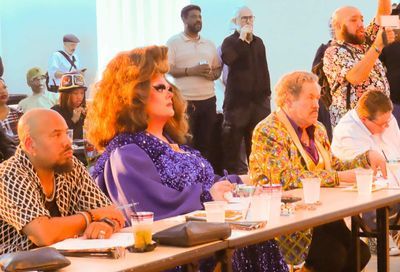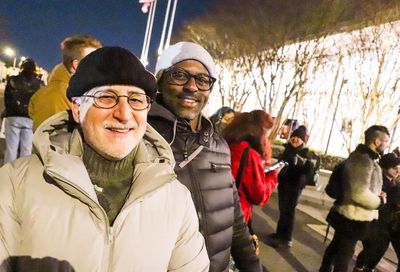Lost Luggage
The ''closet'' -- whether internal or external -- has no place in contemporary society
Gay invisibility can be harmful whether it is self-imposed or socially imposed. Two recent news stories show contrasting ways that the closet creates casualties.
Before the openly gay Brian Betts was murdered in a gay chat-line hookup, he was an acclaimed educator and a D.C. middle school principal beloved by his students. Before the closeted George Rekers was caught returning from a European vacation with a male escort, he was a Family Research Council co-founder who used junk science to attack legal protections for gay people.
The reticence of Washington Post editors to report Betts’s sexual orientation left a hole in the story and kept similar potential victims in the dark. The secret kept by Rekers enabled his malevolent crusade.
Let’s look at the bad guy first.
In 2004, Rekers wrote, ”A foster placement with a homosexual parent figure subjects the child to an additional and unique source of profound psychosocial stress related to the placement of the child in an abnormal family structure with the socially deviant sexual lifestyle of the homosexual foster parent.”
Never mind that homosexuality is not deviant, is no more exclusively sexual than heterosexuality, and is not a ”lifestyle.” The 80-page paper containing that passage is full of similar poison.
The state of Florida paid Rekers $120,000 as an ”expert” witness. Yet in a November 2008 ruling finding Florida’s anti-gay adoption law unconstitutional on equal protection grounds, Judge Cindy S. Lederman of the 11th Judicial Circuit wrote, ”Dr. Rekers’ testimony was far from a neutral and unbiased recitation of the relevant scientific evidence. Dr. Rekers’ beliefs are motivated by his strong ideological and theological convictions that are not consistent with the science. Based on his testimony and demeanor at trial, the court can not consider his testimony to be credible nor worthy of forming the basis of public policy.”
Jo-Vani Roman, the 20-year-old ”rent boy” who described the sexual massages that he provided Rekers, has done a public service in helping neutralize a monster. The comically implausible denials by Rekers (he needed someone to lift his luggage, he seeks out sinners to minister to them) bring to mind the brazenness of a closeted homophobic minister urging publication of the names of closeted ministers. I know of one such minister; unfortunately, my source is not prepared to step forward. The public and the press do not treat the Jo-Vani Romans of the world very well. The ”ick factor” ironically shields hypocrites.
Rekers chooses to live a lie. By contrast, the closet in the Betts story was imposed by Washington Post editors who impose privacy concerns about gay crime victims that they do not invoke about straight victims.
The first time that the Post reported Betts was gay was in a May 9 column by ombudsman Andrew Alexander, who wrote that ”the disclosure of the phone-sex chat shifts the balance to disclosing Betts was gay.” He said it was potentially relevant to the murder (which was similar to other cases), would highlight the dangers of chat-line hookups, and would improve the Post‘s credibility. Alexander quoted Kelly Pickard of Gays and Lesbians Opposing Violence (GLOV): “The fact that he was gay is not as important as the fact that he was most likely targeted because he was gay.”
When openly gay people are effectively closeted by biased editorial policies, it’s time to drag editorial boards into the 21st century. When homophobes privately do the very thing they condemn, they violate Barney Frank’s excellent dictum, ”People have a right to privacy, but not to hypocrisy.” Those able to expose them deserve organized support.
We are reduced to caricatures when our sexual behavior, which is private, is conflated with our orientation, which is not. Those who reinforce this by omission or commission should be firmly told, ”Lift your own luggage.”
Richard J. Rosendall is a writer and activist whose work has appeared on Salon.com and the Independent Gay Forum (www.indegayforum.org). He can be reached at .
Support Metro Weekly’s Journalism
These are challenging times for news organizations. And yet it’s crucial we stay active and provide vital resources and information to both our local readers and the world. So won’t you please take a moment and consider supporting Metro Weekly with a membership? For as little as $5 a month, you can help ensure Metro Weekly magazine and MetroWeekly.com remain free, viable resources as we provide the best, most diverse, culturally-resonant LGBTQ coverage in both the D.C. region and around the world. Memberships come with exclusive perks and discounts, your own personal digital delivery of each week’s magazine (and an archive), access to our Member's Lounge when it launches this fall, and exclusive members-only items like Metro Weekly Membership Mugs and Tote Bags! Check out all our membership levels here and please join us today!




















